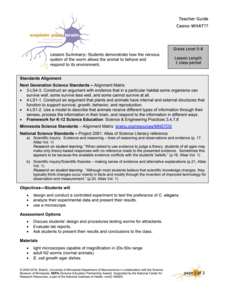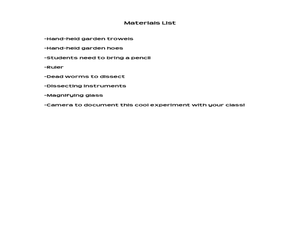University of Minnesota
Chemotaxis Using C. elegans
Have you ever wondered what roundworms are like? Or what they don't like? Explore the sensory preferences of C. elegans through this controlled chemotaxis experiment. Biology class members brainstorm what substances might attract—or...
Curated OER
Chapter 1: The Science of Biology
Provide young biologists with everything they need to excel in the study of lymphatics, the nervous system, hormones, cellular division, and more! Pupils utilize the workbook, complete with end-of-chapter assessment worksheets, to gain...
Captain Planet Foundation
Worm Your Way Out of This
How can you provide healthy soil for your garden? Study worms, bacteria, and other microorganisms in a lesson about decomposition and organic compost. After discussing what you know about worms and watching a video, watch what worms do...
Captain Planet Foundation
Shape Shifters in the Math Garden
Combines mathematical measurement with gardening skills. Third graders hunt for worms in the garden and try to find the longest one. They also measure and weigh vegetables that they harvest from the garden, measure rainfall amounts, and...
University of Minnesota
Caeno-WHAT??
Can you feel that? Can you smell that? Since pupils can't ask worms about their sense of smell and touch, they design and complete an experiment to answer these questions. Individuals expose nematodes to different stimuli using their...
University of Minnesota
C. elegans and Alcohol
Investigate experimental design through a hands-on exploration. A creative lesson allows learners to design an experiment to monitor the effects of alcohol on the C. elegans worm. After conducting the experiment, individuals analyze...
Curated OER
Open Inquiry Using C. elegans
Ever wondered what motivates a roundworm? Introduce your biology class to C. elegans, a non-parasitic model organism that can help them understand behavioral stimuli. Paired pupils design an experiment to test the worm's reaction to...
Museum of Science
Worm Farm
It is not a barrel of monkeys—it's a jar of worms! Scholars create a worm farm in a spaghetti sauce jar. Pupils layer moist soil, sand, and oatmeal to create a habitat for worms. Individuals place worms into the habitat, cover it with...
George Watts Montessori
Upper Elementary Lessons for Classroom and Garden
Plant knowledge by doing to create long-lasting results. Creating a school garden gives young scholars the opportunity to study several science topics. By working through the unit of 16 lessons, pupils use their gardens to complete...
National Wildlife Federation
Soil Decomposers
The class studies the soil food web that includes earthworms and conduct four experiments using the crawly critters. Individuals determine whether earthworms are sensitive to light, touch, temperature, and acid.
Biology Junction
Unsegmented Worms
While you definitely don't want to have tapeworms, they are an interesting species to say the least! They are just one of the species of Platyhelminthes that are part of the lesson presentation. The lesson begins with an overview of the...
Biology Junction
Annelids: The Segmented Worms
Here's a lesson that just might make your class squirm! Learn about segmented worms in a detailed PowerPoint presentation including the wriggly earthworms young scientists dig up in their backyards. Although seemingly simple creatures,...
NOAA
Individual Species in the Deep Sea
A tube worm's outer covering is made of chitin, the same material that makes up the shells of lobsters and crabs. Scholars create tube worms and analyze and discuss the longevity of organisms living near cold seeps. They then discuss and...
Curated OER
Word Worms: Spelling Or Vocab Game
Students engage in a lesson that is concerned with the meaning of different types of vocabulary words. They sort words into different groups and play a game while creating graphic organizers of plants with roots and worms. Students work...
Curated OER
Earthworms
Investigate the wonders of worms, earthworms to be precise. This presentation is perfect prior to studying earthworms in class. It provides basic information about their habitat, life cycle, predators, and what they like to eat.
Curated OER
Sponges, Cnidarians and Worms Concept Map
In this sponges, cnidarians and worms worksheet, students complete a concept map on simple invertebrates. They fill in 11 blanks with the correct answers from the list.
Curated OER
Vermicomposting
First graders investigate composting. In this biology lesson, 1st graders identify ways to use garbage as fertilizer. Students examine soil and compost matter as well as the role of worms in the dirt.
Curated OER
Cows, Worms and Compost
Third graders explore agriculture by viewing a PowerPoint presentation in class. For this animal relationship lesson, 3rd graders identify the types of farm animals humans feed on and their dependency on such small insects like worms....
Curated OER
Can Worms See?
Second graders discuss the previously created worm compost and the importance of living creatures to the Environment. In this worm lesson, 2nd graders observe worms and record their sensitivity to light. Students design a petri dish...
Curated OER
A Science Trail: Worms
Third graders explore worms in multiple ways. In this lesson on worms, 3rd graders search for worms in their natural environment, record data on worms, and dissect worms.
NOAA
What's New?
Biodiversity in some areas is more diverse than one might think. Using a two-day lesson, pupils consider the biodiversity of the Hudson Canyon and the characteristics of one organism. They begin with an analysis of the common earthworm...
Curated OER
Wiggle Worms
First graders investigate worms, collect and analyze data. In this worm and data lesson, 1st graders listen to Chick and Duckling from the Macmillan/McGraw-Hill reading series. They conduct experiments with worms, collect simple data,...
Curated OER
Wiggley Worms
Learners investigate how worms affect plant growth. In this biology lesson plan, students construct a worm ecosystem in a plastic 2 liter bottle and plant a seed in the soil. They later compare the ecosystems with worms to ones without...
Curated OER
Worms! Nature's Recyclers
Third graders explore the process of composting. In this composting lesson, 3rd graders read the book Wonderful Worms, and create composters.

























